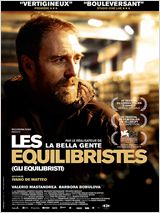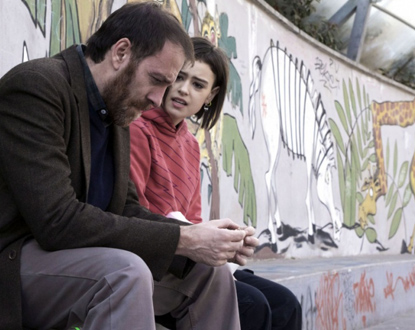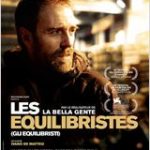The third feature film by the excellent Ivano de Matteo, The Tightrope Walkers, is a touching and honest portrait of a man who goes from an ordinary family life to homelessness in just a few months.
 Giulio has everything to be happy, a loving wife, two children who adore him, and an honest job. But this city hall employee makes the sadly common mistake of cheating on his wife (Barbora Bobulova) with a coworker. As life at home becomes unbearable, the couple decides to divorce. Giulio has no idea of the difficulties awaiting him. Between child support, insurance, taxes, rent, and his son’s dental care, this father does not earn enough from his job to cover all his expenses. Gradually, Giulio withdraws physically and psychologically and blends into the mass of people Italians call the tightrope walkers.
Giulio has everything to be happy, a loving wife, two children who adore him, and an honest job. But this city hall employee makes the sadly common mistake of cheating on his wife (Barbora Bobulova) with a coworker. As life at home becomes unbearable, the couple decides to divorce. Giulio has no idea of the difficulties awaiting him. Between child support, insurance, taxes, rent, and his son’s dental care, this father does not earn enough from his job to cover all his expenses. Gradually, Giulio withdraws physically and psychologically and blends into the mass of people Italians call the tightrope walkers.
It is important to note, to avoid any misunderstanding, that The Tightrope Walkers is in no way a dramatic film about separation. In fact, Ivano De Matteo admits himself, divorce is merely a pretext to describe as accurately as possible the life of these divorced fathers. Too wealthy to receive social benefits, too poor to live properly, and often too proud to return to their families, there are nearly 200,000 living this way. It is this category of the unfortunate that the director decided to depict. And it is a success. However, there emerges a touching and true approach to the recently divorced couple. Even more so when it comes to the relationship between the father and his daughter, played by the promising Rosabell Laurenti Sellers.
The character of Giulio, portrayed by the astonishing Valerio Mastandrea, is simply excellent and vividly true to life. A role that Ivano De Matteo admits is tailor-made for the actor, who had already worked with him in the past. It is especially his gaze that literally transports the audience. Sometimes filled with love and remorse when it comes to his wife and children, sometimes desperately empty and frightened in the face of his situation deteriorating day by day.
The character of Giulio actually goes through three phases during the film: First, he is a funny, loving father who takes his children to school. He regrets his action but continues to love his wife and cannot imagine another life. Then, he becomes a lonely man but keeps in touch with his children. He also retains his sense of humor and pride; there’s no question of anyone knowing about his degrading situation. Finally, Giulio becomes unrecognizable, almost mean, jaded with an empty gaze and almost insane in his demeanor.
The transition in this man’s life is disconcertingly faithful. You can feel the result of meticulous research done before filming. Ivano states that the main character is inspired by several true stories, sometimes even from those close to him. An approach so truthful, it sends chills down your spine thinking, “It happened so quickly, why not me?”. The attention to detail is impressive, particularly in the many scenes where Giulio meticulously calculates his expenses, wondering how to eat, pay for his room, and finance his daughter’s trip to Barcelona.
However, a small negative point: while the film avoids clichés (alcohol, violence, suicide…), we regret a character in the background, almost a spectator of his downfall. While for three-quarters of the film, we admire this man who manages to juggle all his obligations as events unfold, we end up being frustrated seeing fate continuously turning against him without him making any decisions to remedy it. You almost want to shout at him, “Good God, just go back to your wife and end it!”. A slight frustration quickly dissipated by the last 8 minutes of the film, masterfully staged.



